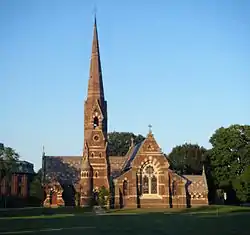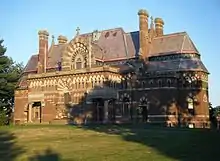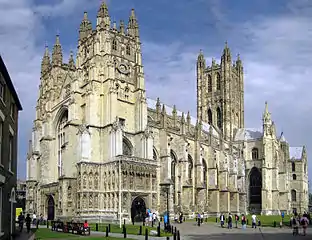Church of the Good Shepherd and Parish House
The Church of the Good Shepherd and Parish House is an Episcopal church at 155 Wyllys Street in Hartford, Connecticut. It was commissioned by Elizabeth Jarvis Colt, the widow of Samuel Colt and completed in 1867. The church and its associated parish house were designed by Edward Tuckerman Potter, and serve as a memorial to Samuel Colt and members of his family. The church and parish house were added to the National Register of Historic Places in 1975,[1][2] and became a contributing property to the Coltsville Historic District in 2008.
Church of the Good Shepherd and Parish House | |
 Church of the Good Shepherd | |
  | |
| Location | 155 Wyllys St., Hartford, Connecticut |
|---|---|
| Coordinates | 41°45′26″N 72°40′9″W |
| Area | 9 acres (3.6 ha) |
| Built | 1867 |
| Architect | Edward Tuckerman Potter |
| Architectural style | Gothic |
| Part of | Coltsville Historic District (ID66000802) |
| NRHP reference No. | 75001925[1] |
| Added to NRHP | February 20, 1975 |

Description and history
The Church of the Good Shepherd is located in Hartford's Coltsville area south of the downtown, on the southeast side of Wyllys Street just south of its junction with Charter Oak Avenue. It is a masonry structure, built out of Portland brownstone and Ohio sandstone. It is roughly T shaped and has Gothic Revival styling. It has a steeply pitched polychrome slate roof, with parapeted gable ends that have crosses at the peaks. A square tower with buttresses rises at one of the crooks of the T, with a low crenellated battlement below the octagonal spire. The interior features a variety of stone types in the construction of the floors and columns, and has heavy chestnut timbers in the roof framing. The southwest entrance arch is carved with examples of the workers' tools used in the Samuel Colt's factory.[2]
The church was commissioned in 1866 by Elizabeth Jarvis Colt, and serves as a memorial to her husband Samuel, who died in 1862, and two of their infant children. The parish house was built in 1895, also to a design by Potter, as a memorial to Colt's son Caldwell Hart Colt who died in 1894. Potter had come out of retirement to design this building. It continues the Gothic architectural detailing found on the church, but is more symmetrical in its massing.[2]
References
| Wikimedia Commons has media related to Church of the Good Shepherd (Hartford, Connecticut). |
- "National Register Information System". National Register of Historic Places. National Park Service. March 13, 2009.
- "NRHP nomination for Church of the Good Shepherd and Parish House" (pdf). National Park Service. Retrieved 20 December 2011.
